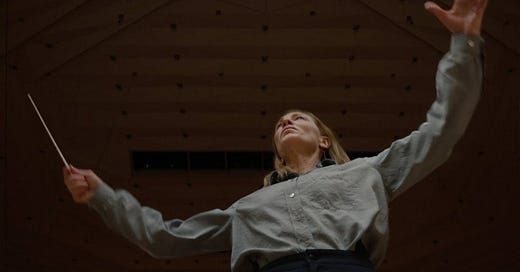Todd Field makes movies that you feel.
They are hard to write about. Easier to talk about, as your brain and your mouth are moving at roughly the same speed, so you can’t really intellectualize your words as they spill out. Eventually, something smart will leak out.
As I sit here typing, after 3 trips to Field’s Tár, the process of writing is overwhelmed by the many directions my brain wants to go at the same time in discussing the movie without spoiling it for anyone, though I am not sure it can be spoiled. Any story point I mention is a bit like reading the ingredients in a great chef’s dish before eating it… the taste overwhelms the preconception.
There is so much just in the name “Tár.” Pretension, illusion, self-creation, and a guide to what will happen to this person in the third act of the film.
My first visit with Tár was at Telluride and much of what the movie was overwhelmed by the depth of Field’s dive into classical music. The language and insights are as dense and beautiful and beyond the knowledge of the vast majority of even the well-educated audiences that will see this film that it is like the music itself. It is overwhelming.
Lydia Tár’s alleged mentor, Leonard Bernstein famously simplified the access to classical music for the masses on television with gentility and open-heartedness (which some remember directly and most will soon be reminded of in great depth by Bradley Cooper’s next film, a Bernstein biopic). The one thing we know for sure about Lydia’s relationship with Bernstein is that she was inspired by and kept VHS copies of Bernstein’s televised Young People's Concerts that he did with the New York Philharmonic. What we know of Lydia Tár is that in her ascendance, she has not become capable of giving to anyone (wherever you might put this notion in your judgement of Bernstein’s fuller life timeline) with that generosity of spirit.
In the opening sequence of the film - which follows a 30 second amuse bouche that will, at the very end of the film, become a key - we see Lydia warming up for a public interview with New Yorker writer Adam Gopnik much as she does for a concert. And indeed, we find out during her lengthy, relentlessly laudatory introduction by him, that even in that, he is just the instrument, playing the song she already wrote, orchestrated, and annotated.
She, too, is an instrument. Her choices of when to smile, when not to smile, how she breathes, what she finds funny, how she presents something as obvious when she must know that most of the audience doesn’t know the details… a symphony.
It’s one of Fields’ great achievements in the film… the silence and the sound. The sound design of the film (Stephen Griffiths, Matis Rei, Roland Winke & Co) is as important as the great cinematography (Florian Hoffmeister). Part of this is Lydia’s ear, which hears every noise coming from any direction, often bothering her to distraction. But it’s also a theme within the movie… the bubble in which so many of us live… so dense with sound, but in which small things can break the tuning we have each so carefully done for our comfort and sense of peace.
In many ways, Lydia Tár is a reflection of Dr. Bill in Eyes Wide Shut, a film Field was in and very into, from one of the most influential artists on his work, Kubrick. She, like Dr. Bill, is a highly successful professional with a wife and a kid who has lost connection with their true core of passions and desires. She has a certain coldness and repetition in every area of her life, except for with her child. (Kubrick barely engaged the child in EWS.) Unlike the Dr. Bill journey, Lydia Tár has already moved past the “should I cheat on my wife?” question. She has reached that next step that Dr. Bill was obsessed with, in which she has deigned herself to be above morality as judged by anyone but herself. So maybe we should see it as a completely disconnected sequel.
When Tár is challenged by the incursion of a moment of harsh reality (which EWS doesn’t do until the end of the film), she has one of her few non-symphonic “hot” moments in the film and is physically compelled to push away… and turns the switch to bring herself back into her ideal image within minutes.
It’s a point of fascination that will be interpreted and re-interpreted in the years to come that there are so few heated moments with Lydia in the film.
Keep reading with a 7-day free trial
Subscribe to The Hot Button by David Poland to keep reading this post and get 7 days of free access to the full post archives.





